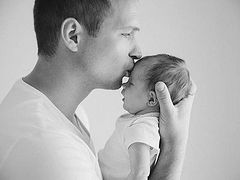 Photo: Konstantin Makov/photogorky.ru
Photo: Konstantin Makov/photogorky.ru
A man went on with his life, enduring it as usual, when all of a sudden, he realized that for the most part, the cause of his sufferings was his parents’ attitude toward him and toward his very presence. Perhaps he had previously thought about this own, or maybe it was only recently that scholars explained this matter to him.
And it’s true, one time his parents didn’t show enough sympathy, or another time they cut him too much slack—but now “this is who I am,” all grown up. I turned out the way I turned out: I am all grown up but it still hurts here and there. “How come? You were the adults, the strong and experienced ones, while I was so helpless and young! You should have done this but you didn’t, you weren’t supposed to do that but you did it—you should have known better! It’s because of you that my life is so screwed up! Thanks to you, I messed things up so badly that I can’t even think of it without shuddering! Because of you, my life turned out so badly.”
Different people suffer in different ways: someone just gets upset about every little thing, another is truly traumatized but holds it together, whereas yet another had such a horrendous life that they are afraid to even talk about it. But what can you do with feelings! So what you get is an embittered person, knocking about and unwilling to forgive those who wronged him, but struggling under the weight of the grudges he holds.
God often arranges it so that we learn from others
God often arranges it so that we learn from others. For example, someone holds grudges against his parents, but when his own children grow older, it turns out they also have their grievances, and they are often perfectly reasonable ones. What’s there to be surprised at? Once people become parents, they often reproduce the same model of behavior they acquired in childhood. Even if they don’t replicate it, they still make certain mistakes.
Children present their grievances, you get sincerely indignant not just that “eggs are trying to teach the hen1,” but because of their exceedingly high expectations of you as a parent. Why can’t you, like anyone else, make mistakes? You have your own psychological traumas from childhood that keep you from being an ideal parent.
Today, it is common to pay attention to a wide range of aspects of family life, and human interactions in general, and I by and large consider this a positive tendency—we must learn to be attentive to one another. However, as it often happens, this trend has some negative side effects. One of them is excessive demands on the parent.
If you read articles, as well as posts and comments in social networks on this topic, one gets the impression that a modern parent should be a top-notch teacher, psychologist, should have a successful career, and be a natural-born babysitter: should, should, should... All these “shoulds” far exceed the abilities of the average person. Even two people can’t handle such a burden.
If babies were only born to those who meet all the above requirements, mankind would go extinct in no time. Similarly, if there were a law dictating that only a person without any psychological traumas can become a parent, then no babies would be born.
So, now, when your children are old enough to unload their grudges on you, recall your own feelings of resentment towards your parents and think: could it really be that your parents didn’t have traumas of their own, including ones from childhood? Surely, they did. And where from? Inherited from previous generations. I think, if we dug deep enough into the history of psychological trauma, we’d reach right back to Adam and Eve.
Such is the fallen world—we can’t help traumatizing one another
There is no one on earth that grew up without traumas or without a single mistake in his upbringing. Such is the fallen world—we can’t help traumatizing one another. But God gives us the medicine, which is the possibility and even the necessity to forgive. It turns out that forgiveness is not only a means to relieve emotional stress but also a moral duty.
It may seem like a tough imperative, but forgiveness is in fact the path to freedom. One person is unwilling to forgive, while another believes that there are some things cannot be forgiven. Yet another is willing to forgive, but only when the wrongdoer asks for forgiveness or demonstrates at least some level of conscious awareness of the problem. This makes him dependent on that same wrongdoer. But the Lord teaches to forgive; the Lord speaks about freedom.
Truly, how hard it is to forgive! Sometimes it seems completely out of the question. Besides, the level of difficulty isn’t always proportional to the severity of the grudge. So, what should we do? Well, at least have some pity. Pity doesn’t always have to be humiliating, this word has been known to have two connotations for some time already. Pity, in the sense of compassion or awareness of someone else’s psychological injury, is a constructive emotion. Once you take pity on your loved ones, it is easier to then forgive them. Even if that person acted horribly, imagine what must have been going on in his soul to have been capable of committing such a terrible thing. Take pity on him. It is not a cure-all, but maybe this will help.



